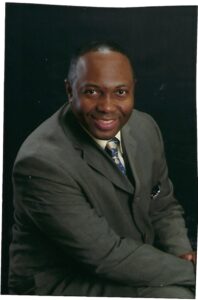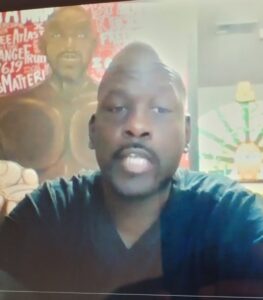The Exodus of Black Men from Church
Introduction
As an African American male doctoral student of Theology, Founder of 20/20 VISION, and seasoned pastor of Baptist churches in Atlanta, Georgia, Brooklyn, New York, Oakland and San Jose, California, I have been searching for answers to these questions, “What are the reasons for the exodus of Black men (especially Millennials and GEN Xers) from the Church? and How might the Church respond holistically?”
My search for answers to this problem began when I was matriculating at Union Theological Seminary (New York) in the Master of Divinity Program. As a senior systematic theology student at Union, I wrote my senior thesis on “The Absence of the Black Man from Church”. My advisor was the late Dr. James H. Cone. One of the discoveries from that project was the disproportionate number of females to males attending Black churches throughout the nation. I discovered the fact that Sunday worship service attendance in many Black churches had in attendance a ratio of 30 percent males and 70 percent females. The majority of the males were between the ages of 17 years old or below and 60 years old and above. Millennials and Gen Xers were missing from many local churches. This issue is still reflected in churches throughout the country today. According to the Pew Report, Black men (especially Millennials and GEN Xers) are least likely to be actively engaged in local churches.
Following the tragic death of George Floyd, I was inspired to form 20/20 VISION: A Collaborative Learning, Healing and Action Group to discuss issues that impact Black men and the Black community. This group consists of mainly Millennials and GEN Xers. They were also active participants in the Focus Group Interviews.
20/20 VISION Leadership Team
Explanation of the project and research process—
Focus Group Interviews:
In my search for the reasons for the exodus of Black men from the Church, and to gather an understanding of what some Black men are seeking from the Church, I used the ethnographic qualitative research methodology with the focus group interview approach. The ethnological qualitative methodology was used to hear the unique story of each participant. The participants included unchurched and churched Black Millennials and GEN Xers in the Bay Area. By unchurched, I am referring to Black men who left the church and those who have never been a part of the church. I interviewed twenty (20) Black men in focus groups over a period of three months.
Interviews of Pastors:
To gather an understanding of how local Churches can reach and engage Black men in ministry and build an effective Men’s Ministries, I conducted one-on-one interviews with eleven (11) Pastors (seven male and four female Pastors) with strong Men’s Ministries.
As the Facilitator of the one-on-one interviews, I used the ethnographic qualitative research method to ask each Pastor probing questions either in person or by Zoom. I observed attentively and listened deeply to the responses of each Pastor. The interviews were recorded by Zoom or audio recorder if the interview was done in person.
Interpretation: Findings and Future Implications—
Throughout this project, I have explored the many reasons discovered for the exodus of Black men (especially Millennials and GEN Xers) from the church. These reasons are not new reasons but represent why the male attendance in the Black Church in the past and presently continues to be poor in comparison to females.
Among those reasons are:
Institutional Factors:
1. Hypocrisy of Leaders Craig W., GEN X, Fine Artist & Educator. “Stated some Church Leaders preach about how the congregants should live their lives, but in their own personal lives, some were living a totally different life.”
2. Lack of Evangelism by other Black men. Evangelism or outreach to Black men by other Black men who are similar to them in age and background is lacking.
3. Out of Touch with Relevant Issues. Several participants stated local churches they attended were out of touch with issues that impact Black men and the Black community.
4. Absent from Social Activism. Many of the participants stated some of the most pressing issues within most African American communities across this nation are not being addressed by local churches.
5. Leadership’s inability to shift with Change. Willis M., GEN X, computer engineer, has been searching for the right church even before the pandemic, after leaving his home church because his home church would not embrace change. “The church membership has declined significantly, no longer reflects the community where it is located, nor meets his needs.”
6. Leadership struggle with leading Men. Not every Pastor know how to lead strong men nor women. Sometimes strong men are seen as a threat to an insecure Pastor.
Personal Factors
7. The lack of Support Groups. Throughout our nation and even in many churches, people have been marginalized because they are dealing with or have been impacted by different types of addictions (drugs, alcohol, sex) incarceration, mental illness, homelessness, depression, job loss, etc… Many people who are trying to get back on their feet need help along the way.
8. Money Issues. Several participants questioned how local churches were spending the church’s financial resources. They asked the following questions: Where is the money (tithes, offerings and fundraisers) going? Who has control over how the money is being spent? Why can’t we use the money to help the members and community that need help?
9. Limited Opportunities for Leadership Development. Several participants criticized the church because of the lack of shared leadership. Young men and women of all ages are excluded or barely represented in leadership capacities in most Black Churches. When the Church does not acknowledge, nurture and utilize the gifts of all its members, then we lose them. It has been said, if you don’t use your gifts, you will lose them!
10. Spirituality/Universalism/ I’m Good. Moe O., a Millennial, Actor, Activist and Educator stated “you don’t need organized religion to live right, and practice morals, ethics, and values. You don’t need to physically be in a building, in order to have sound morals.” This view has increased even more for men and women since the global pandemic.
If the Black Church is serious about reaching and engaging Black men in Ministry, she must be willing to address these issues and others. The Church needs to take a critical look at its history; the traditions that are not working need to be buried or altered, and those traditions that have been successful in the past need to be resurrected and made relevant to these times. This is a critical time for the Church to pivot and re-imagine what the Church will look like going forward.
Many Black men who are dissatisfied with the Black Church because of its shift from social activism to self-piety and other reasons need to realize that we cannot throw the baby out with the bath water. The Black Church has been the backbone of the Black community. It is the place where we should be able to find spiritual guidance and nurturing, the place where leadership is developed, a source of strong moral and ethical values, a place for family support and development, a community and educational center, and a power base for economic and political reform.
There are many questions that this project does not address, but I believe it demonstrates that churches that are addressing the needs of Black men and are willing to meet them where they are, are already seeing the fruits of their labor, both spiritually and numerically. I cannot emphasize enough the necessity of the Black Church to go into the community and even in the prison system to minister to Black men where they are. The Church can no longer wait for Black men to come to the Church. Jesus commissioned the Church to go and make disciples wherever they are! The Black church need these unchurched Men and they need the re-imagined Church.
For further readings you may want to consider the following:
Michelle Alexander, The New Jim Crow: Mass Incarceration in the Age of Colorblindness, 2020, The New Press, New York
Robert M. Franklin, Moral Leadership: Integrity, Courage, Imagination, 2020, Orbis Books, New York
Henry Louis Gates Jr. Louis, The Black Church: This Is Our Story, This Is Our Song, 2021, Penguin Books, New York
Eric Lincoln and Lawrence H. Mamiya, The Black Church in the African American Experience, 1st edition (Durham: Duke University Press Books, 1990
Pew Research Center, “Faith and Religion Among Black Americans,” February 16, 2021





